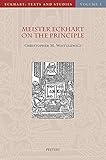Meister Eckhart on the principle : an analysis of the principium in his Latin works / by Christopher M. Wojtulewicz.
Material type: TextSeries: Eckhart : texts and studies ; 005Publication details: Leuven : Peeters, 2017.Description: xii, 285 p. ; 25 cmISBN:
TextSeries: Eckhart : texts and studies ; 005Publication details: Leuven : Peeters, 2017.Description: xii, 285 p. ; 25 cmISBN: - 9789042932531
- 9042932538
- BV5095.E3 W64 2017
- BQT 2409.E4.T46S-5
| Item type | Current library | Call number | Status | Barcode | |
|---|---|---|---|---|---|
 Opera (Magaz.)
Opera (Magaz.)
|
Biblioteca "Angelicum" Pont. Univ. S.Tommaso d'Aquino Magazzino | BQT 2409.E4.T46S-5 (Browse shelf(Opens below)) | Available | 0030203837 |
Includes bibliographical references (pages 255-272) and indexes.
Being and becoming in the principium -- Principium as creative -- Generation in principio -- Christology and human personhood in the principium.
Back cover: "What is this 'principle' (principium) in which God is said to have created heaven and earth?" This is the first question Eckhart poses at the very beginning of his Commentary on Genesis. In the course of this book a space is opened up in order to speak about the relationship between God and creation in a 'principial' way. Tracing the concept as it is used throughout his Latin (and, on occasion, German) works, the panoply and resonance of its use establish the necessary place of principium within the vocabulary of Eckhart's metaphysics of creation and generation. Ranging from the nature of being to the question of what constitutes human personhood, the 'principle' serves to identify Eckhart's teaching on the mutual compenetration between God and man.


